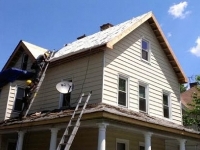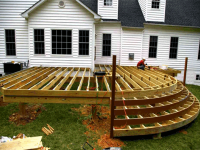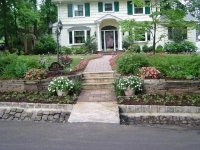if a neighbor's tree falls into our yard, who pays for removal?
The neighbor is responsible. If any of the at risk trees pose a danger to property or personal injury on your property, a municipality will sometimes get involved and issue a warning. If you send a certified letter to the neighbor about the trees it may compel action on the basis that if none is taken after written notice, its insurance company may decline coverage for any claims arising from the tree(s) falling.
Regarding the dead but still standing trees, approach the neighbor and ask that they be removed. If they refuse, then you can contact the town and if they agree with you that the trees are dangerous they will likely force the neighbor to remove them.
Regarding the fallen tree, I'm not sure if your homeowner's pays for damages, removal costs for the parts of the tree that have now fallen onto your property or if theirs pays, so I can't help you with that part of your query.
If I recall correctly one of my neighbor's (A) had a large tree limb from another neighbor's (B) property fall onto A's garage and do significant damage. A thought that B's insurance would cover it since it was B's tree, but it ended up being A's insurance that had to cover it. Not sure the reason why.
Thanks all! So it sounds then like the neighbor is responsible for removing existing, non-fallen dead trees that may pose a risk provided the city agrees; and that the neighbor can be compelled to do so if necessary. However, I'm still not clear about who is responsible for the already-fallen tree that originated on my neighbor's property, but is now on our's. Is the consensus that in that situation, we are responsible for it's removal? Thanks again -
A.J.
After googling about NJ trees and laws, it seems that if it was an act of God (healthy tree knocked over in a storm) then that part on your property is your responsibility even though the tree originated in your neighbor's yard. However, if there was negligence, such as the tree was clearly dead and they ignored it, then they may be liable for the cost of removal even if it fell onto your property.
Take this with a grain of salt though, I ain't no lawyer, I just googled it.
I think that's accurate^. If it was a healthy tree that fell it's your responsibility to remove, but if it was neglectfully not removed and it fell it's the responsibility of the property it originated from. If limbs extend onto your property you can remove them.
Basically if it falls in your yard you have to clean it up. You would have to prove negligence to make your neighbor clean it up.
I am not a lawyer either.
alexj said:
Thanks all! So it sounds then like the neighbor is responsible for removing existing, non-fallen dead trees that may pose a risk provided the city agrees; and that the neighbor can be compelled to do so if necessary. However, I'm still not clear about who is responsible for the already-fallen tree that originated on my neighbor's property, but is now on our's. Is the consensus that in that situation, we are responsible for it's removal? Thanks again -
A.J.
According to my insurance company (when we were involved in a similar situation after Sandy), it is the responsibility of the property owner where the tree falls, NOT where the tree was growing. They said that the only exception would be if the "victim" property owner had previously issued a written notice to the tree owner, putting them on notice that the tree was a hazard and needed to be removed.
SAC's theory feels plausible (the idea that the fallen tree is our responsibility unless we'd previously warned our neighbor in writing about the necessity of it's removal), though perhaps I should ask our home owner's insurance also just to check. Our insurance company has also, incidentally, previously advised us against EVER making any claims unless our house basically burns down, since it will adversely affect rates, etc., so (in this case) since we're talking about $1500 total, etc., it probably wouldn't be worth it to actually involve them as far as compensation...
Perhaps I'll end up suggesting that the neighbor and our family just split the bill, with us paying for the existing fallen tree's removal and they paying for the portion devoted to removing the still-standing dead or near-dead trees (that the tree guy also recommended we remove right away) (?)
- A.J.
I believe that SAC is right about responsibilities. Fallen trees tend not to be covered by insurance, unless they hit your house, or unless you have special insurance that covers your landscaping.
The one thing that raises questions with me is the use of "technically"...if you have been inadvertently treating club land as yours for many years there may be another level of complexity (which others can address better than I can).
As stated above, you are responsible for any part of tree on your property. If property damage occurs,your insurance takes care of you and will subrogate your neighbors insurance company. In regards to potential unhealthy trees, you need to have an arborist certify as such and then notify neighbor and your insurance company in writing. At this point the town may also get involved.
susan1014 said:
The one thing that raises questions with me is the use of "technically"...if you have been inadvertently treating club land as yours for many years there may be another level of complexity (which others can address better than I can).
It's land on the immediately opposite side of our neighbor's fence at the rear of our backyard. We haven't been "using" it per se - it's just a row of (some dying) trees (some of which we've already paid to previously have removed) on this small hill slope. Parts of the upper branches of those trees also overlook the neighbor's property, so it would similarly be in their interest to have them removed (especially if the trees are actually on their property).
- A.J.
for the one that fell-if the club knew or should have known the trees were a danger, they are liable due to negligence....but if they didn't or reasonably didn't know, then you are responsible
Yeah, don't actually use your homeowners unless it is something that you truly can't pay for. If the tree went through your roof, or even your garage roof, you use insurance. But if it is something you can cover then as much as it sucks you need to pay out of pocket.
I recall a thread awhile back where someone was burglarized a few times, it was a couple of hundred each time, and so they made claims and then were dropped by their homeowners.
spontaneous said:
Yeah, don't actually use your homeowners unless it is something that you
truly can't pay for. If the tree went through your roof, or even your
garage roof, you use insurance. But if it is something you can cover
then as much as it sucks you need to pay out of pocket.
I recall a thread awhile back where someone was burglarized a few times, it was a couple of hundred each time, and so they made claims and then were dropped by their homeowners.
Interesting.
One would think with a deductible its not worth putting in a claim for a couple of hundred. My deductible is 1,000 for each occurrence. Any claim less than 1,000 would be a waste of my time. So would a claim of for example 1,100. I'd only get 100 back after all the work to do the claim with the added possibility of a rate increase.
You have a point of not making a claim unless its a lot. Which makes me think if I decide not to make claims for less than 3,000 that maybe I should increase my deductible.
Wouldn't the insurer for neighbor A then go after insurer for neighbor B for reimbursement (or am I thinking of a car accident)?
spontaneous said:
If I recall correctly one of my neighbor's (A) had a large tree limb from another neighbor's (B) property fall onto A's garage and do significant damage. A thought that B's insurance would cover it since it was B's tree, but it ended up being A's insurance that had to cover it. Not sure the reason why.
BG9 said:
spontaneous said:
Yeah, don't actually use your homeowners unless it is something that you
truly can't pay for. If the tree went through your roof, or even your
garage roof, you use insurance. But if it is something you can cover
then as much as it sucks you need to pay out of pocket.
I recall a thread awhile back where someone was burglarized a few times, it was a couple of hundred each time, and so they made claims and then were dropped by their homeowners.
Interesting.
One would think with a deductible its not worth putting in a claim for a couple of hundred. My deductible is 1,000 for each occurrence. Any claim less than 1,000 would be a waste of my time. So would a claim of for example 1,100. I'd only get 100 back after all the work to do the claim with the added possibility of a rate increase.
You have a point of not making a claim unless its a lot. Which makes me think if I decide not to make claims for less than 3,000 that maybe I should increase my deductible.
I haven't looked at my homeowners policy in years (bad, I know) but I know that with my car insurance I can choose different deductibles, ranging from $300 to $1,500, the higher the deductible the lower the rate. Maybe there is a similar option on homeowners?
yahooyahoo said:
Wouldn't the insurer for neighbor A then go after insurer for neighbor B for reimbursement (or am I thinking of a car accident)?
spontaneous said:
If I recall correctly one of my neighbor's (A) had a large tree limb from another neighbor's (B) property fall onto A's garage and do significant damage. A thought that B's insurance would cover it since it was B's tree, but it ended up being A's insurance that had to cover it. Not sure the reason why.
Reason why is that B was not liable.
joan_crystal said:
yahooyahoo said:
Wouldn't the insurer for neighbor A then go after insurer for neighbor B for reimbursement (or am I thinking of a car accident)?
spontaneous said:
If I recall correctly one of my neighbor's (A) had a large tree limb from another neighbor's (B) property fall onto A's garage and do significant damage. A thought that B's insurance would cover it since it was B's tree, but it ended up being A's insurance that had to cover it. Not sure the reason why.
Reason why is that B was not liable.
I'm not sure it is only car accidents, but apparently the precedent for insurance coverage related to tree damage is well established and insurer for A will only go after insurer for B if there had previously been a formal communication from A to B that the tree was hazardous and asking them to remedy the situation. At least that is what my insurer (Chubb) told me in similar circumstances.
I do believe if you can prove the owner of the tree otherwise knew of the danger (even if you didn't personally notify them), then they are liable...its just that sending them formal notification is the easiest way. but, for example, you see XYZ tree company out there inspecting trees in June. In september, there is a hurricane, the trees come down and cause damage...if XYZ verifies owner was told trees were a danger and needed to come down, that should be proof of negligence.
The neighbor is responsible for the incident. He should have consulted the tree removal service for the removal of the dead trees. It was his responsibility to take care of the tree in his yard. My aunt has also came across this situation, but in time she hired the professional tree removal service about which she got to know through her friend. One can click here to know how a tree removal service can save your property from getting damaged.
^^ This is incorrect (MatthewLewis). Numerous posters above gave you the correct information (SAC, joan-crystal, fabulouswalls). A property owner has no liability for damage done to neighbors property by a falling tree without evidence of negligence. In answer to the OPs question, the cost of clean up is yours absent a showing that your neighbor was placed on notice of a dangerous condition and did nothing. Send the certified letter to them now about the other trees that you see as a potential problem. If (hopefully it doesn't) the trees eventually do fall and cause any property damage you will have best postured yourself to foist the remediation costs on them.
Sometimes sh!t happens without anyone being at fault.
jmitw said:
I do believe if you can prove the owner of the tree otherwise knew of the danger (even if you didn't personally notify them), then they are liable...its just that sending them formal notification is the easiest way. but, for example, you see XYZ tree company out there inspecting trees in June. In september, there is a hurricane, the trees come down and cause damage...if XYZ verifies owner was told trees were a danger and needed to come down, that should be proof of negligence.
This may be sufficient if XYZ is actually willing to provide the evidence. But since XYZ was probably hired by the owner of the tree, I'm not sure that they would do so voluntarily and I don't know that they can be compelled to do so.
I was told the same thing that sac was by State Farm Insurance.
This happened to us a few years ago and DannyArcher is correct; greatly to our surprise we had to pay for removal of the tree even though it clearly originated on our neighbor's property. The only way the neighbor would have had to pay is if we had asked him prior to the fall to do something about the tree or expressed concern about it or there was other evidence of negligence. We went to the neighbor privately and he realized it as the right thing to do and paid for part of the tree removal -- but he did not have to, he was just a good guy.
Yes, this is correct. We had a massive tree a few years back fall from our backyard onto our neighbors house. Completely uprooted due to excessive moisture in the ground. We did pay for the removal of the tree however because we felt it was the right thing to do. They unfortunately had massive damage to their roof and a couple of their cars.
sac said:
According to my insurance company (when we were involved in a similar situation after Sandy), it is the responsibility of the property owner where the tree falls, NOT where the tree was growing. They said that the only exception would be if the "victim" property owner had previously issued a written notice to the tree owner, putting them on notice that the tree was a hazard and needed to be removed.
For Sale
Garage Sales
-
HUGE Rummage sale to benefit the Bloomfield High School Robotics Team Sale Date: Apr 27, 2024
More info
Sponsored Business
Promote your business here - Businesses get highlighted throughout the site and you can add a deal.































(sounds like a philosophical question, I know )...Our backyard borders a private club. Recently a tree fell into our backyard. At first we thought the border of our property was such that the tree that fell originated on OUR property. However, after consulting our land survey, we see that this tree technically originated (along with other dead trees that are in danger of also potentially falling) on the private club's property. My question: who is responsible for paying for:
)...Our backyard borders a private club. Recently a tree fell into our backyard. At first we thought the border of our property was such that the tree that fell originated on OUR property. However, after consulting our land survey, we see that this tree technically originated (along with other dead trees that are in danger of also potentially falling) on the private club's property. My question: who is responsible for paying for:
- the removal of the tree that has already fallen (that was technically on the private club's property, but fell onto our properly?)
Also: if the remaining dead (but not yet fallen) trees that are technically on the private club's property pose a danger (as they do) to not only our property but also the private club's (and other neighbors' properties), can the private club be obligated to pay now for the removal of the trees for the safety of all concerned? I ask because we'd like to get rid of all dangerous trees NOW (after what happened), but wasn't sure if the neighbor could simply say they didn't want to deal with it now, etc., thus obligating us to pay for it ourselves if we want it done now.
Of course, we haven't talked to them so I'm hopefully/optimistic we'll just work something out, but wanted to check "the rules" beforehand!
Thanks for any thoughts -
- A.J.